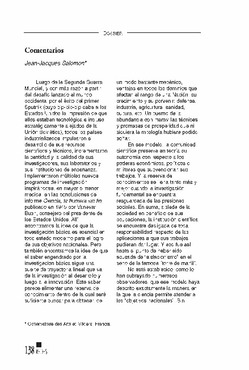Comentarios

Visualizar/
Data
1999-11Autor
Salomon, Jean-Jacques; Hart, David; Dagnino, Renato; Jamison, Andrew; Ordoñez, JavierMetadata
Mostrar registro completoResumo
Luego de la Segunda Guerra Mundial, y con más razón a partir del desafío lanzado al mundo occidental por el éxito del primer Sputnik (cuyo bip-bip-bip daba a los Estados Unidos la impresión de que ellos estaban tecnológica e incluso estratégicamente alejados de la Unión Soviética), todos los países industrializados impulsaron el desarrollo de sus recursos científicos y técnicos, incrementaron la cantidad y la calidad de sus investigadores, sus laboratorios y sus instituciones de enseñanza. Implementaron múltiples nuevos programas de investigación inspirándose, en mayor o menor medida, en las conclusiones del informe Ciencia, la frontera sin fin, publicado en 1945 por Vanevar Bush, consejero del presidente de los Estados Unidos. Allí encontramos la idea de que la investigación básica es esencial en todo estado moderno para el logro de sus objetivos nacionales. Pero también encontramos la idea de que el saber engendrado por la investigación básica sigue una suerte de trayectoria lineal que va de la investigación al desarrollo y luego a la innovación. Este saber parece alimentar una reserva de conocimiento dentro de la cual será suficiente buscar para obtener, de un modo bastante mecánico, ventajas en todos los dominios que afectan al rango de una Nación, su crecimiento y su porvenir: defensa, industria, agricultura, sanidad, cultura, etc. Un cuerno de la abundancia con maravillas técnicas y promesas de prosperidad que ni siquiera la mitología hubiera podido soñar. After the Second World War, and even more so after the challenge launched to the Western world by the success of the first Sputnik (whose beep-beep-beep gave the United States the impression that they were technologically and even strategically far from the Soviet Union), all industrialized countries promoted the development of their scientific and technical resources, increased the quantity and quality of their researchers, their laboratories and their teaching institutions. They implemented multiple new research programs inspired, to a greater or lesser extent, by the conclusions of the report Science, the Endless Frontier, published in 1945 by Vanevar Bush, advisor to the president of the United States. There we find the idea that basic research is essential in every modern state to achieve its national objectives. But we also find the idea that the knowledge generated by basic research follows a kind of linear trajectory that goes from research to development and then to innovation. This knowledge seems to feed a reserve of knowledge within which it will be enough to search to obtain, in a rather mechanical way, advantages in all the domains that affect the rank of a Nation, its growth and its future: defense, industry, agriculture, health , culture, etc. A horn of plenty with technical wonders and promises of prosperity that not even mythology could have dreamed of.
